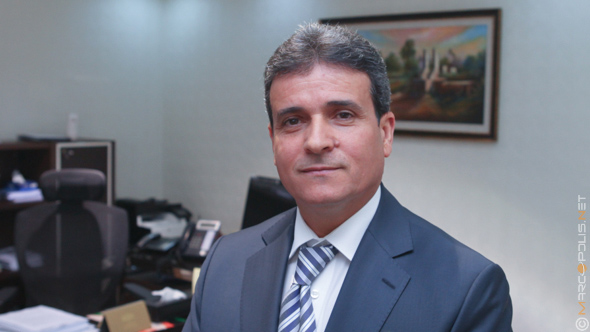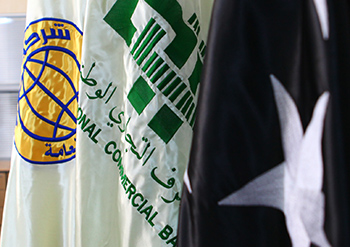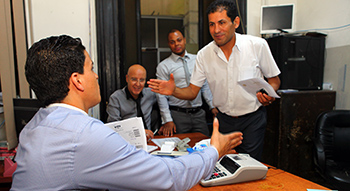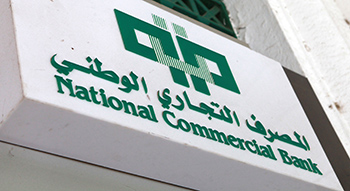National Commercial Bank: Strategy to Become the Best Bank in Libya
Suleiman E. Alazzabi, Managing Director of National Commercial Bank (NCB)
National Commercial Bank expects 5 to 10% growth of the Libyan banking sector in 2013/2014. As a part of their strategy, National Commercial Bank plans to establish a financial leasing company that will merge the traditional commercial side with the Islamic one, and an IT company. The Bank’s vision is to be the market leader in terms of transparency, quality and quantity of products. The MD is sure the National Commercial Bank will differentiate from other Libyan banks in terms of services and transparency during 2014/2015.
Interview with Suleiman E. Alazzabi, Managing Director of National Commercial Bank (NCB)

What is the relationship between the Central Bank of Libya and National Commercial Bank? Are they somehow pushing you to spend on the economy given that they (the State) indirectly own NCB?
No, they are not forcing us. National Commercial Bank is fully owned by the Central Bank, however they are not forcing us. They force us in different ways, for example indirectly with the ratios. Otherwise they do not force us to finance this project or that project; it is up to us to decide where we will invest our money.
You are an international banker, you have spent some time in the Gulf region, how would compare the banking in the Gulf to the banking in Libya?
You cannot compare the two. We are behind the Gulf by a year perhaps. They are much more advanced than us in terms of organisation, system, set up, staff, and recruitment―basically in everything. However, we can improve in all these areas gradually, and most importantly, we are eager to do so.

What is the outlook for the privatization of the Libyan banking sector?
I think it is too early to begin to privatize the banking sector for many reasons. The reasons include the quality of staff that we have right now, the environment in general, communications, the system etc. Theoretically you can say and plan whatever you like but the most important thing is the implementation. The implementation requires many tools, and qualified staff is one of those tools. You also need good communication infrastructure. We want physical implementation and privatization which in my opinion takes at least 3 or 4 years’ time to prepare. Some banks such as Sahara Bank and Wahda Bank have been privatized but I think they are yet to succeed.
What is your estimate for the growth of the banking sector in 2013 and 2014?
I expect a moderate growth; somewhere between 5 or 10%. I don’t expect greater growth than that because the new Islamic Law will force all banks to pause and watch attentively how the situation will develop.
Let’s talk a bit about the Islamic banking reform. Libya is the third country in the world (after Iran and Sudan) to put a nationwide ban on interest. When do you expect lending to businesses to restart?
In our NCB strategy, there is a plan which I hope will be approved at the next board meeting, to establish a financial leasing company. It will act in both areas of the banking law; there will be a traditional commercial side and an Islamic side. It will be completely unique. The only way I can get profit and penetrate the market is with leasing transactions. It will be a good opportunity for us. National Commercial Bank is the only bank that has really thought hard about establishing a leasing company in Libya.
So for the time being, there is no leasing company in Libya?
No, we don’t have it here yet. When I was working in Turkey I established and ran a leasing company and so from that background I want to establish a leasing company here in Libya and hopefully we can penetrate the market in a positive way.
I think it is too early to begin to privatize the banking sector for many reasons. The reasons include the quality of staff that we have right now, the environment in general, communications, the system etc. Theoretically you can say and plan whatever you like but the most important thing is the implementation. The implementation requires many tools, and qualified staff is one of those tools.
What is the 5 year strategy and vision for NCB?
Our vision is to be the market leader in terms of transparency, quality and quantity of products. It is a very simple and clear vision. As I already mentioned, the most important thing is the implementation.
We had our own strategy set by McKinsey consulting group which expired in 2011, and so now we are in contact with other consulting companies to create a plan to reorganize and refresh our strategy.
Our goals and objectives are clear. I believe we will start to implement the strategy in the autumn of 2013. We will establish an office to run the projects.
Apart from that, we have also started to re-brand the bank. We are in the final stage; we have the concept design so that all our branches will have the same design and size etc.
In terms of technology, we hope the next board meeting will approve of establishing an IT company that will work in terms of a service level agreement. The IT company should then handle everything in terms of technology, electronic payments etc. This is one of the key pillars within the NCB strategy.
Are you also thinking of updating the core banking system?
Yes. Furthermore in terms of training, we will send 85 people to Canada, the US, the UK and Ireland at the end of September 2013 and more will go in March 2014.
For other projects we are going to send 200 people abroad to study project finance and management. We have a good plan for training. I hope that in 2014 you will see a completely changed National Commercial Bank.
How much investment do you think these initiatives and plans will require over these 2 years?
In my opinion I can’t say for sure but roughly it could be an investment of between 35 to 45 million Libyan dinars to completely reorganize the bank. It could be even more than that.
In terms of your branch network, are you planning on expanding or consolidating?
We are going to reorganize the entire bank. We are now working on establishing a COU, a central operations unit. We have a team here who will work there and centralize everything. We are trying to reorganize cheque clearing and to do something for the core banking itself. We would also like to change the business processes. We are trying to change or improve many things.
In terms of having a strategic partner, what are the latest developments on this front? Should this happen by privatization of NCB or by having a long term strategic partnership with other banks abroad?
As I said to you, this bank is owned by the Central Bank and so it is not my decision to say that I will have a strategic partner in terms of shareholders and ownership. However, having a strategic partner in terms of technology for example is up to us and we are working on it. In terms of shareholders and ownership, that is the Central Bank’s decision. I do think the Central Bank is really thinking about privatization but I have no exact idea about it.
In terms of successful banks abroad, which one is your favorite model or bank? Which sort of structure would you like to implement?
There are many banks that could be our benchmark. NCB is a mixed bank; we are not just a corporate bank or a retail bank, but we are a mixed bank.
I personally like HSBC, they are very active, and you can find HSBC everywhere. It doesn’t mean I don’t like other banks but I do like the HSBC model. I would like to copy that here in Libya.
Is there any other bank in the MENA region that you feel has a system that could work here?
As I said to you I like many banks, in Turkey I like IsBank, Garanti Bank and Yapi Kredi which are banks that are doing very well and I like their system. In some Arabic countries Arab Bank is doing very well and is very well known.
Are you planning on focusing on project finance or retail banking in the future?
In my opinion for the time being we are going to focus on project finance because the country needs such a product. For retail banking you need very well educated people because you are dealing with people, retail and services and as long as we don’t have good communications or services infrastructure here in Libya it means retail banking will be more difficult. It is also difficult to make good profit out of retail banking. Therefore in my opinion we will be deeply focused on project financing at least over the next 3 years.
Where do you see the biggest money lending opportunities?
In construction and oil & gas.
Would the lending be to foreign companies or local companies?
It depends on the project financing and the project. If the project sounds good and secure then it will be financed. There are many opportunities here; we need a lot of infrastructure. Who comes first and offers the right, well thought-out project will get the financing.
Are you also thinking about syndicated loans?
We have done this for Libyan Airlines and African Airlines and many other projects.
Is this something of interest to you for the future?
 Of course. If the Central Bank gives us a little bit more freedom we can make cross border transactions, syndicate and share, however at the moment we are not very free to work outside of Libya because of the currency and the fact that we deal with Libyan dinars. This will change in the future.
Of course. If the Central Bank gives us a little bit more freedom we can make cross border transactions, syndicate and share, however at the moment we are not very free to work outside of Libya because of the currency and the fact that we deal with Libyan dinars. This will change in the future.
Can you give us a time frame?
It should happen in two or three years’ time.
What makes NCB one of the best banks in Libya? What differentiates you from the other banks?
Currently we are similar to other banks, but I am sure that in 2014 or 2015 we will be very different in terms of quality and services. We will differentiate in quality of services and transparency.
Do you have a final message to conclude this interview?
This month we received the balance sheet and income statement and we made 73 million Libyan dinars net profit. I think we will increase our profit to 120 or 130 million Libyan dinars in 2013. We are not doing badly; it is not excellent but we are doing well.